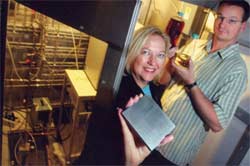Washington-based energy solutions company Innovatek has invented a revolutionary microreactor that has the capability of converting most any liquid fuel into hydrogen. The microreactor is a first of its kind device that could change the entire automotive landscape and finally free America from it's dependance on foreign sources of fuel. 
Each microreactor weighs less than one pound and can be linked to other units to give the group a higher output of hydrogen fuel. Innovatek says it has developed connected systems that can produce one to 160 gallons of hydrogen per minute -- an accomplishment that perfectly enables it to be used in small spaces for automobile transportation.
Innovatek’s device is called the InnovaGen fuel processor. It uses microscopic channels and proprietary catalysts to continuously produce hydrogen from a variety of hydrocarbon sources. “Rather than natural gas, which is something we can also use, we have been focusing on liquid fuels,” Irving says. “That includes things like gasoline, biodiesel, vegetable oil and other renewables.”
The fuel processor works by combining two feeds, one of a hydrocarbon and the other of water, in a catalytic reactor. “We use microtechnology to scale down the system into something that can be held in your hand, and produce hydrogen that can be fed directly into the fuel cell,” Irving says. “Rather than using a huge plant that produces hydrogen that is compressed into cylinders, our device can be integrated directly into the fuel cell as a component of an overall system.”
InnovaTek's microreactor overcomes numerous stumbling blocks for hydrogen-powered car adoption including the elimination of the highly pressurized hydrogen storage tanks, the lack of a nationwide hydrogen pipeline system and the immense cost of adding hydrogen fuel stations across the country. Because of its use of biodiesel as a feed stock the microreactor will complete a carbon neutral chain of energy that would outperform any other kind of automotive propulsion including plug-in electric vehicles.
The company has already signed a $1.8 million contract with the US Navy to develop portable refueling for Marine combat systems and it has plans to license its technology for automotive use with high hopes to integrate it into vehicles by 2010.

